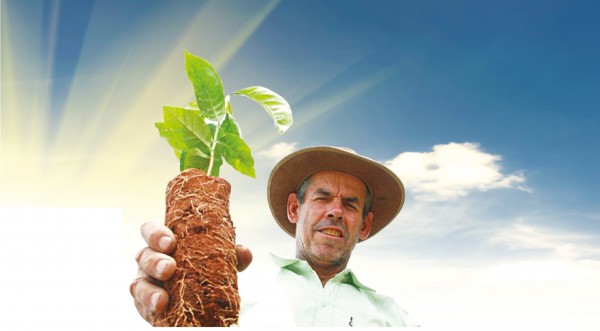
July 28 is Farmers’ Day in Brazil. The day was chosen by former president Juscelino Kubitschek, when the Ministry of Agriculture completed 100 years, in 1960.
Before agriculture, human beings were nomads and were constantly moving. When the first agricultural techniques were developed, human beings began to plant their own food and the whole structure of civilization was modified. Without that advent, success in the evolution process of societies would have been difficult to achieve and to be successful.
Undoubtedly today Brazil is a major world power in the production of grains, fibers, coffee, meat, sugar, biofuels and also in the generation and dissemination of knowledge and technology for the rural areas. The agribusiness competitiveness results from the technology employed in the fields, the efficiency of production areas and of the exporters segment, excellence in teaching and research institutions; and, we should highlight, entrepreneurship and organization of Brazilian farmers.
Thanks to the efficiency of Brazilian agriculture, in 50 years Brazil — then a food importer — became one of the largest agricultural powers of the world. During this period, the price of food dropped 50% and allowed most of the population to have access to healthy and diversified food items, which were translated into greater social gains, especially benefitting the increasing urban population.
Farmers have an expressive relevance for the Brazilian economy and also for the global population, since it is their activity that provide the greater part of food production.
The internationally recognized role assumed by Brazilian farmers and by the whole national agribusiness led the country to be driven by the United Nations (UN) to supply 40% of food to the increasing world population, which will expand to 11 billion inhabitants from the current 7 billion by 2050.
The expected growth of the population, middle-class and income, especially in Asian countries, annually expands the demand for diversified products and good quality products, as the proteins of animal origin.
A feasible task, which is preceded by an immediate challenge is to act in food safety issues, considering that 800 million people in the world are in a state of extreme poverty.
Brazil is not only a leader in the activity, but also has the most sustainable agriculture of the Earth, and is among the countries that are most committed to environmental preservation.
According to recent Environmental Rural Register (CAR) results, we note that farmers are responsible for a large part of environmental conservation. According to data compiled by Embrapa, 20.5% of the preserved vegetation is located in private rural properties, while 13.1% is located in conservation units, 13.8% in Native Indian lands, and 18.9% are considered freehold and without any title deeds. Brazil has 66.3% of conserved native vegetation, showing to the world that it is possible to balance food production and environmental conservation.
In relation to the coffee productive chain, Brazil is the top leader worldwide; It is the largest producer, largest exporter and second largest consumer of coffee. And to be a Brazilian coffee producer is also good business, encompassing all aspects of sustainability: economic, social and environmental.
Furthermore, Brazil is first in the rank of countries that transfer most of the FOB (Free on Board – amount negotiated per arabica coffee bag placed on board of the ship) to farmers. According to the methodology of the IPEP/Cecafe indicator – Participation of domestic prices in the FOB of Brazilian Arabica coffee exports – which represents the percentage of prices received by farmers — Brazil transfers approximately 90% of the prices. Such level demonstrates the logistics efficiency of the coffee productive chain as well as its transparency.

According to the IPEP/Cecafe analysis, in addition to prices transferred to farmers to support Brazilian coffee crops, the export sector also develops various actions on the field involving sustainability.
Cecafe, supported by its strategic partners, works to bring knowledge to the less assisted farmers through the Digital Coffee Farmer Program, the purpose of which is to improve digital inclusion, productivity, income, rural population quality of life, and at the same time to maintain natural resources, mitigating negative impacts. The dissemination of good agricultural and management practices, aims at increasing farmers’ resilience and at training them to surpass all challenges that agriculture presents.
From 2017 onwards, the export sector will also work towards gender equality, entrepreneurship and family succession in farms, through actions directed towards young people and women. These initiatives place Brazil in a prominent position.
Marcos Matos – Chief Executive – CECAFE
Marjorie Miranda – Coordinator of Social Responsibility and Sustainability Projects – CECAFE


Leave A Comment